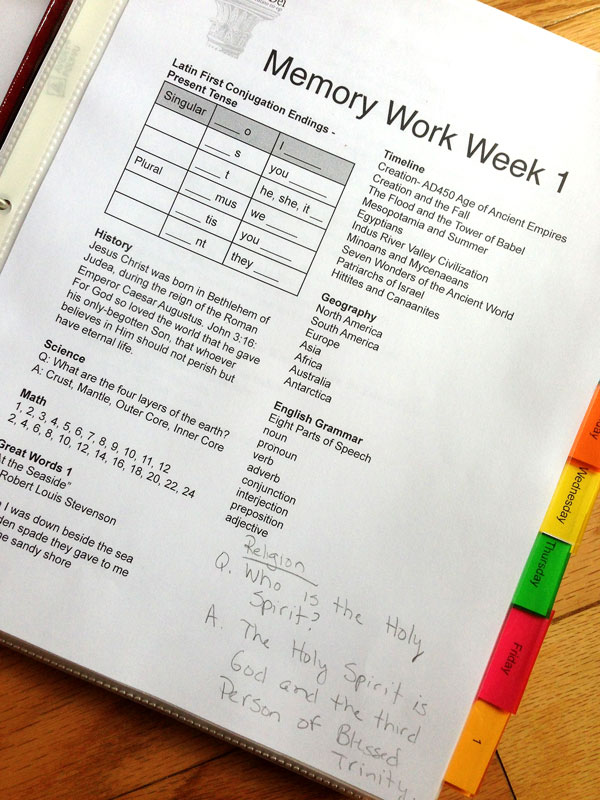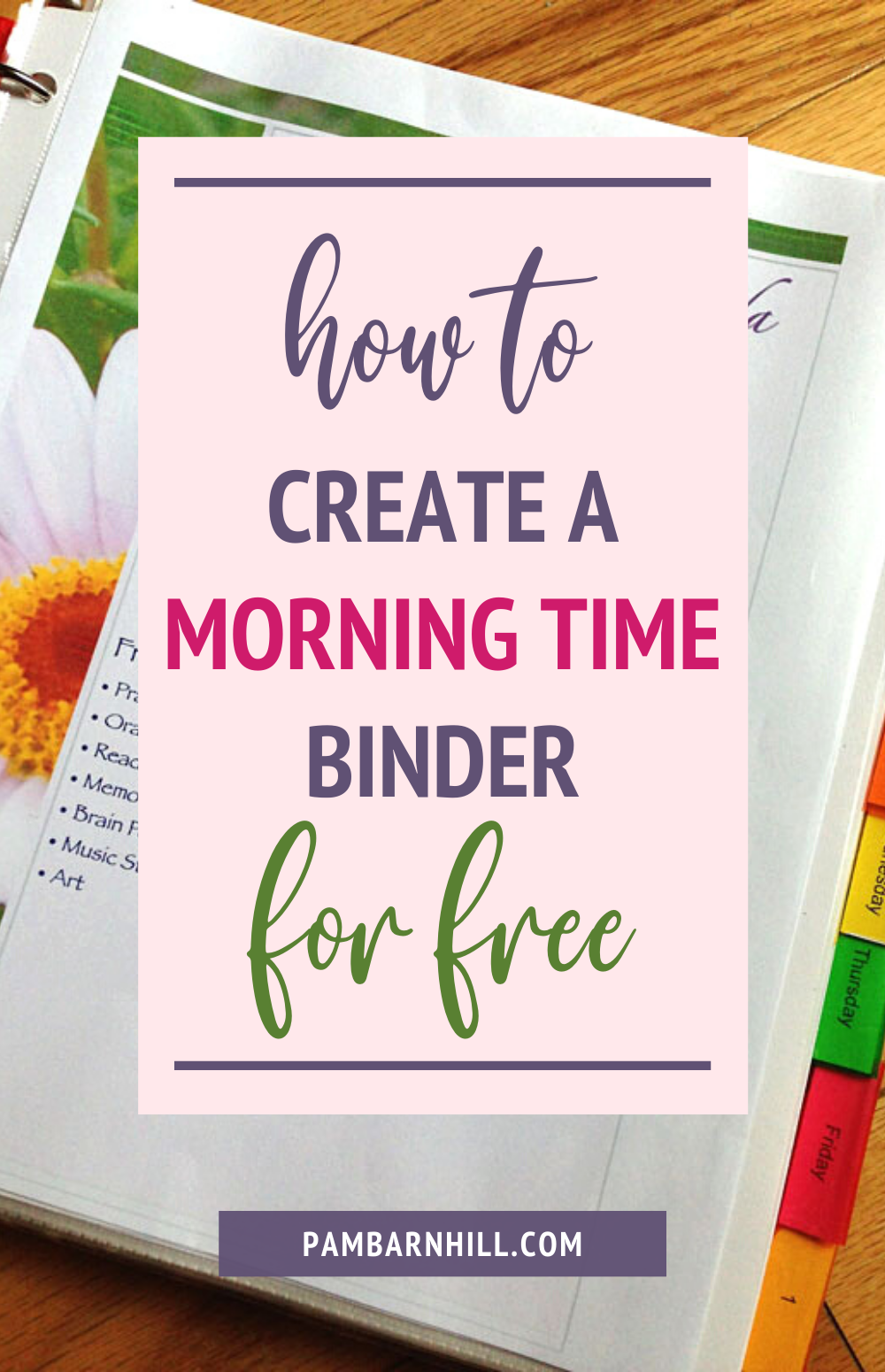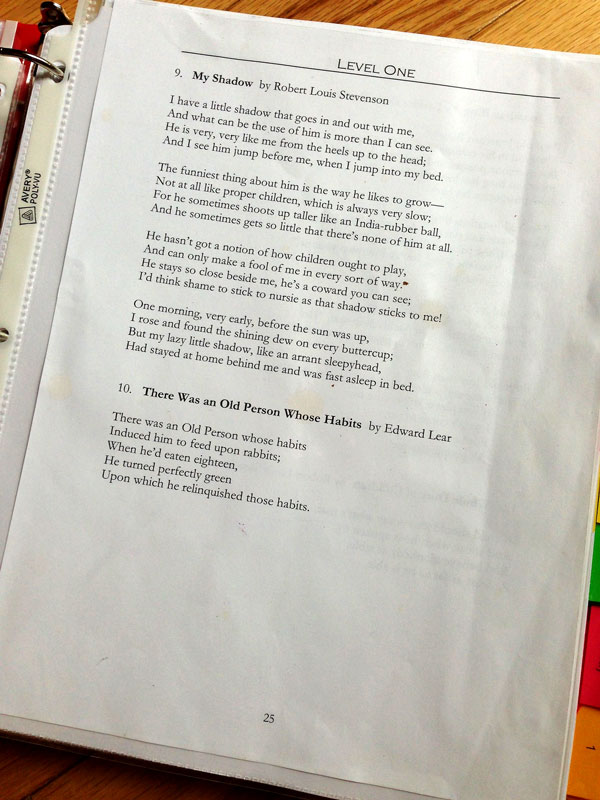Another nuts and bolts post here, but this little gem has already been worth its weight in gold, and we are only in week four of the school year. Meet the new Morning Time Binder. Ta-da!
Isn’t it just the loveliest thing ever? Ok, most of the loveliness is in the practicality. Let me give you a tour.
The morning time agenda
This is key. I can’t tell you how many times I will forget to do something altogether without my list. Like I said before, Morning Time goes pretty quickly around here as we jump from topic to topic. This list helps me make sure I haven’t left anything out. As you can see, I have already started penciling in new topics. It will be in flux for about a month or so and then I will nail it down and retype it.
On to the memory work
The meat of the binder is basically the Simply Charlotte Mason memory system in binder form. I chose binder over card file because I wanted to be able to insert complete pages of information, not just single poems or verses of scripture. So I have a tab for daily, even days, odd days, Monday, Wednesday, Friday, and then all the days of the month. I only have the one binder for myself. The kids learn all of the memory work by listening.
Side note: I found tabs that would allow you to use page protectors and still see the tabs. They stick out far beyond the protector. This was important to me because I wanted the sheets of memory work to be protected for a long time, but I also wanted to be able to see the tabs!
New memory work always sits under the daily tab. Once it is mastered, it then moves to review — first on an even or odd day, next once a week, and finally once a month.
So what do we memorize?
We have been using Linguistic Development through Poetry Memorization from IEW since last year. We really like the poems and up until the end of last year, we were using it exactly as written — reciting every poem every day. The poems are a varied selection between short and long, serious and fun. The best part is — it’s all done for me. I do have the CDs. I bought them at the homeschool convention last March. As of right now, we are finding them totally unnecessary, but that’s just us.
Next on our list of memory items is co-op memory work. Every two weeks we get new memory work in various subjects — very similar to Classical Conversations (CC) or Classically Catholic Memory (CCM) — because in fact, the memory work comes from both of those two sources. The memory work is introduced to the kids at the co-op, and then we review it at home.
Finally, I have a few other things to add to the binder. One goal this year is to memorize the books of the Bible. Catechism and scripture are on the list, and I spent a recent evening at the bookstore thumbing through How to Teach Your Children Shakespeare. I found this book incredibly inspiring, and I can’t wait to start memorizing for the kids to start memorizing Shakespeare. You better believe the Bard is about to go in the binder, even if we take it really slow and only learn a new piece per term.
But isn’t it a lot?
It is! Especially since we were doing the every-poem-every-day method, and we were up to about ten poems. Something had to give.
Now for the scary part: I cut the binding off of my Linguistic Development through Poetry Memorization. (Ack! I know!) Now all of the old poems we know are in the binder and are reviewed according to the SCM system instead of the “every poem everyday system” that Pudewa uses. I had to do this, simply because of the volume of memory work we do — it was either that or drop the poems, which I didn’t want to do.
What I did not do was separate the poems from their pages. A page (front and back) is a unit of memory work. So as an example, right now we are memorizing “The Whole Duty of Children” by Robert Lewis Stevenson. This poem is behind our “Daily” tab. That means the other three poems on the front and back of the page with that poem are also repeated daily even though we know them pretty well. The poems will move through the system as a unit.
This does not mean I introduce them as a unit, though. When we put a fresh page in and start learning the first poem on that page, we focus on one stanza at a time until it is pretty familiar. So for a long while, there might be a page in our daily tab, but we are only having to recite a stanza or two from it. All other memory work is also introduced in the daily tab. Right now we are doing four poems and a page of co-op memory work each day. Tomorrow (Tuesday) we will get new co-op memory work. That means the old co-op memory work will move to the even tab. Even days we will be doing two pages of co-op memory work and our page of poems. Odd days the new co-op memory work and the poems only. It’s a bit, but I believe it is worth it. There are few things more beneficial in training the brain than memory work, and I think our schools are far worse off for letting it slide.
 |
| A page of co-op memory work. Since our group is ecumenical, we don’t do religion at co-op, but I do add it at home. |
My plan right now is to memorize the co-op work by week until about week 10. Then after that time, all of the old weekly sheets will be removed from the binder (wherever they may be in the system — daily, weekly, monthly), and I will replace those with by-subject sheets. This means that we will be reciting all ten weeks of science together and all ten weeks of history together. There is no magic formula for when this should occur — it just so happens that I have the memory work already typed up ten weeks to a page. Why switch? Well, one of the goals is for the kids to be able to tell the story of a historical period in about forty sentences. Grouping the memory work by subject will help with that.
So by now your eyes are crossing
And you are wondering how it the world I get my kids to do all of this each day without all-out mutiny. Kids hate this stuff, right? Not really. For the most part, they do love to memorize and are very good at it. They like being very good at something too! Here are a few things that help, though.
1) It’s a together thing.
I do not typically quiz them on the memory work (per se — see below). I used to do that. I would open the page and have them recite (usually alone) and tell them where they were right or wrong. Major fail. Now we open the binder, and I do it with them. My only rule is that your mouth be moving, because you really don’t remember if all you do is listen.
2) We have Funday Mondays.
I got this from another CC mom last year whom I now can’t remember to link to. On Mondays, we play a review game with the co-op portion of our memory work. It takes a little longer, but they think it is fun. Come to think of it, I should probably just add the poems in here too. There are tons of great review games online. Check out Half A Hundred Acre Wood for an awesome list.
3) We use songs.
If there is a song, I play it. I keep iTunes playlists of things we are memorizing on my iPhone. Most of the songs come from CC and CCM Cds. There are a few I have arranged myself or found on Amazon. The kids love the songs.
4) We get silly.
We use these cards made for phonics chants in our memory work practice. The kids pull a card and then we recite poems in pirate speak, volcano voice, or while doing jumping jacks. Oh my gosh, they love these. (I don’t mind as long as we don’t pull jumping jacks for a four-stanza poem.)
And that’s it. I do wish we had this system last year for all of our CC memory work. They have forgotten so much of that. Now we can learn our memory work going forward and retain it through the use of the binder.
Questions?
I know some of this makes perfect sense to me and comes across clear as mud to you. Please ask if you have a question. It may take a day or two, but I am always happy to answer.
Start your own Morning Time habit
If you would like help getting started with Morning Time, download a sample month of our ready-made Morning Time plans.
- How to Transform Math Lessons without Changing your Curriculum with Denise Gaskins - April 26, 2024
- Homeschooling Boys with Durenda Wilson - April 12, 2024
- What About Lab Sciences? with Dr. Moon - March 29, 2024






